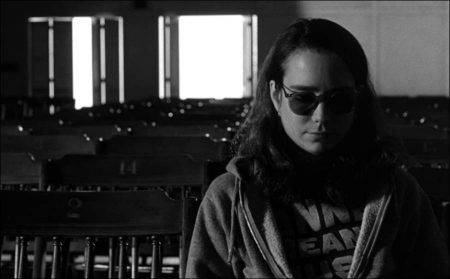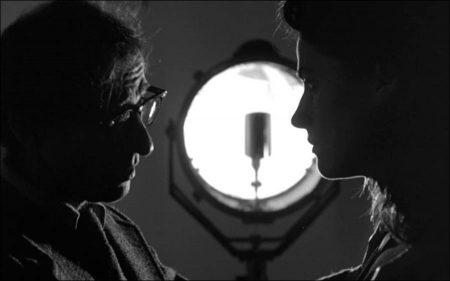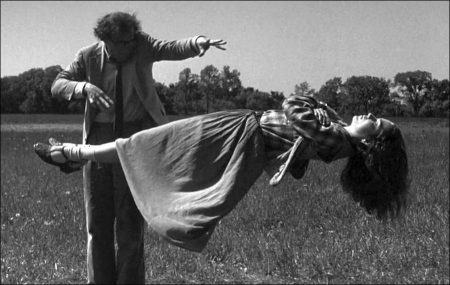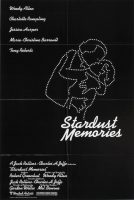Stardust Memories movie storyline. Renowned filmmaker Sandy Bates is in a professional transition, directing largely comedies early in his career now wanting to direct more serious movies so that he can explore the meaning of life, most specifically his own. Most are fighting him all along the way, including the movie going public, who continually tell him that they love his movies especially the earlier funny ones, to studio executives who are trying to insert comic elements wherever possible into his current movie in production.
He reluctantly agrees to attend a weekend long film festival of his movies. Despite the throng of requests for his time, he is further able to reflect on his life as he addresses the questions at the post screening Q&A sessions. He also reflects specifically on his love life as his current girlfriend, married Isobel, shows up unexpectedly, and as he starts to fall for festival attendee Daisy – at the festival with her Columbia professor boyfriend, Jack Abel – who reminds him of Dorrie, a neurotic former girlfriend who he probably considers the one that unfortunately got away.

Stardust Memories is a 1980 American comedy-drama film written and directed by Woody Allen and starring himself, Charlotte Rampling, Jessica Harper and Marie-Christine Barrault. Sharon Stone has a brief role, in her film debut. The film is about a filmmaker who recalls his life and his loves – the inspirations for his films – while attending a retrospective of his work. The film is shot in black and white and is reminiscent of Federico Fellini’s 8½ (1963), which it parodies.
Stardust Memories was nominated for a Writers Guild of America Award for Best Comedy written directly for screen, but was not warmly received by critics on its original release, and is not among the most renowned works in Allen’s filmography. The film has nonetheless been re-evaluated to some extent, with modern reception more often positive than negative. Allen, who denies that the work is autobiographical and has expressed regret that audiences interpreted it as such, even considers it to be one of his finest, alongside The Purple Rose of Cairo and Match Point.
Film Review for Stardust Memories
The movie begins by acknowledging its sources of visual inspiration. We see a claustrophobic Allen trapped in a railroad car (that’s from the opening of “8 1/2,” with Marcello Mastroianni trapped in an auto), and the harsh black-and-white lighting and the ticking of a clock on the sound track give us a cross-reference to the nightmare that opens Ingmar Bergman’s “Wild Strawberries.” Are these the exact scenes Allen had in mind? Probably, but no matter; he clearly intends “Stardust Memories” to be his “8 1/2,” and it develops as a portrait of the artist’s complaints.
Most of the action of the film centers around two subjects. The first is a weekend film seminar (obviously patterned after Judith Crist’s weekends at Tarrytown, N.Y.), to which the Allen character has been invited. The second subject is a very familiar one, Allen’s stormy relationships with women. The subjects blend into the basic complaint of the Woody Allen persona we have come to know and love, and can be summarized briefly: If I’m so famous and brilliant and everybody loves me, then why doesn’t anybody in particular love me?
At the film seminar, the Allen character is constantly besieged by groupies. They come in all styles: pathetic young girls who want to sleep with him, fans who want his autograph, weekend culture vultures, and people who spend all their time at one event promoting the next one they’re attending. Allen makes his point early, by shooting these unfortunate creatures in close-up with a wide-angle lens that makes them all look like Martians with big noses. They add up to a nightmare, a nonstop invasion of privacy, a shrill chorus of people whose praise for the artist is really a call for attention.
Fine, except what else does Allen have to say about them? Nothing. In the Fellini film, the director-hero was surrounded by sycophants, business associates, would-be collaborators, wives, mistresses, old friends, all of whom made calls on his humanity. In the Allen picture, there’s no depth, no personal context: They’re only making calls on his time. What’s more, the Fellini character was at least trying to create something, to harass his badgered brain into some feeble act of thought. But the Allen character expresses only impotence, despair, uncertainty, discouragement.
All through the film, Allen keeps talking about diseases, catastrophes, bad luck that befalls even the most successful. Yes, but that’s what artists are for: to hurl their imagination, joy, and conviction into the silent maw. Sorry if I got a little carried away. “Stardust Memories” inspires that kind of frustration, though, because it’s the first Woody Allen film in which impotence has become the situation rather than the problem. This is a movie about a guy who has given up. His relationships with women illustrate that; after the marvelous and complex women in “Annie Hall” and Manhattan, in “Stardust Memories” we get a series of enigmas and we never really feel that Allen is connecting with them. These women don’t represent failed relationships, they represent walk-throughs.
Woody Allen has always loved jazz and the great mainstream American popular music. There’s a lot of it in “Stardust Memories,” but it doesn’t amplify or illustrate the scene this time it steals them. There’s a scene where Allen remembers a wonderful spring morning spent with a former love (Charlotte Rampling), and how he looked up in his apartment to see her there, and for a moment felt that life was perfect. As Allen shows that moment, Louis Armstrong sings “Stardust” on the sound track, and something happens that should not be allowed to happen. We find our attention almost entirely on Armstrong’s wonderfully loose jazz phrasing.
“Stardust Memories” is a disappointment. It needs some larger idea, some sort of organizing force, to pull together all these scenes of bitching and moaning, and make them lead somewhere.
Stardust Memories (1980)
Directed by: Woody Allen
Starring: Woody Allen, Charlotte Rampling, Jessica Harper, Marie-Christine Barrault, Tony Roberts, Daniel Stern, Amy Wright, Helen Hanft, Anne De Salvo, Leonardo Cimino, Sharon Stone
Screenplay by: Woody Allen
Production Design by: Mel Bourne
Cinematography by: Gordon Willis
Film Editing by: Susan E. Morse
Costume Design by: Santo Loquasto
Set Decoration by: Steven J. Jordan
Art Direction by: Michael Molly
MPAA Rating: None.
Distributed by: United Artists
Release Date: September 26, 1980
Views: 186


